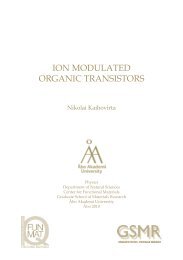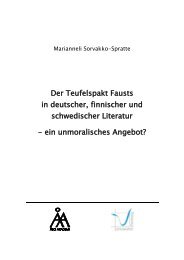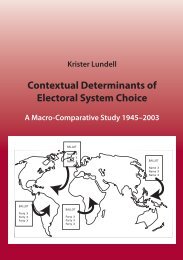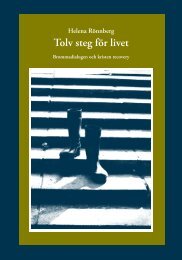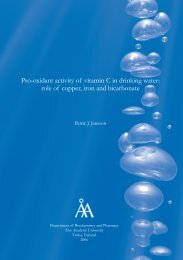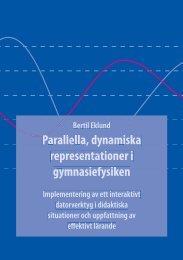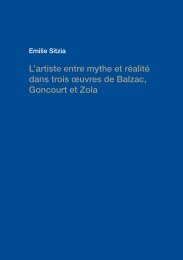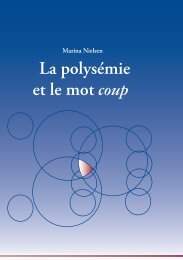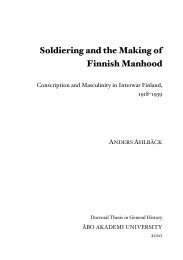122gerecht richten kann (Römer 2:14–15). 273 Alle Menschen werden vomeigenen Gewissen verurteilt, und somit kann kein Mensch sich vor Gottmit seinem Nicht-Wissen entschuldigen. Wegen der Wirkung des imGewissen wirkenden natürlichen Gesetzes ist der Mensch vor sich undvor Gott inexcusabilis, unentschuldbar geworden. 274Nach <strong>Calvin</strong> ist das Gewissen vor allem ein religiöses Empfinden oderWissen, dessen Ziel Gott und eine lebendige Zuneigung zur Gottesverehrungbilden. 275 Zu jenem Ziel kann es gelangen, indem es demMenschen seine tatsächliche Natur zeigt und ihn somit dazu bringt, dasser sich auf die Gnade und Vergebung Gottes verlässt. Es kann aber denMenschen auch zum Unglauben oder zur Furcht bringen, falls es derGnade Gottes nicht begegnet. 276 In seiner vorrangigen Funktion übt dasGewissen also die usus paedagogigus legis aus, wenn es den Menschen zurSuche nach der Gnade Gottes treibt.273 “Siquidem testatur Apostolus, Gentes quae Legem non habent, dum Legis operafaciunt, sibi pro Lege esse, ac ostendere opus Legis scriptum in cordibus suis, testimoniumillis reddente conscientia, et cogitationibus inter se accusantibus, aut excusantibus coramiudicio Dei [Rom. 2. b. 14]” IIii22 — Helm 2004, 371 “But whatever the exact position wasoriginally, whether the knowledge of the natural law was innate or acquired <strong>Calvin</strong> is clearthat at present, in his sinful and fallen condition, man is unable by the exercise of his ownpowers alone (action that is 'natural' in yet another sense) to reacquire and retain theknowledge of God's natural law in its entirety. <strong>Calvin</strong> is emphatic on this point, as <strong>bei</strong>ng theplight of fallen humankind, all ‘in Adam'. Yet he characteristically adds that through thecontinued activity of conscience each man knows enough of God's original, natural law, asa result of which he is rendered inexcusable before God for his sin.”274 "Finis ergo legis naturalis est, ut reddatur homo inexcusabilis." IIii22 — “the law ofnature ultimately places sinful humanity under the verdict, ‘inexcusable’” Hesselink 1992, 59.— Schreiner 1991, 66: “In opposition to Plato, <strong>Calvin</strong> censured the reliance on humnaunderstanding. The knowledge of natural law, <strong>Calvin</strong> argued, disproved the Platonic theorythat sin resulted from ignorance. ... Therefore, coram Deo the knowledge of natural law rendesfallen men and women inexcusable:”275 "His enim verbis vivum esse colendi Dei affectum, sincerumque pie et sancte vivendistudium indicat. ... Itaque sicut opera respectum ad homines habent, ita conscientia ad Deumrefertur:" IIIxix16, IVx4276 "Ipsa praecipue conscientia incumbente peccatorum mole oppressa, nunc secumquerulatur ac gemit, nunc se arguit, nunc tacite fremit, nunc aperte tumultuatur. Sive ergores adversae iram Dei prae se ferunt, sive eius argumentum et materiam conscientia in sereperit, inde tela et machinas ad profligandam fidem icredulitas arripit:" IIIii20, "Unde fit utplus unde timoris et consternationis sentiat conscientia, quam securitatis." IIIxiv20
123Obwohl das Gewissen für <strong>Calvin</strong> vorrangig ein geistliches Empfinden ist,sieht er, dass einige Stellen des Neuen Testaments das Gewissen mit demweltlichen Leben verbinden. <strong>Das</strong> sind zwei Aussagen des Paulus: manmuss der Obrigkeit wegen des Gewissens und nicht wegen der Furcht voreiner Strafe gehorchen (Römer 13:1,5), und er übt sich darin, allezeit einunverletztes Gewissen vor Gott und den Menschen zu haben (Apg. 24:16).Die Zustimmung <strong>Calvin</strong>s zur Wirkung des Gewissens in Verhältnissenzwischen Menschen wird dadurch begrenzt, dass er in den Verhältnissenzwischen Menschen nur äußere Früchte sieht und dass er das eigentlicheZiel des Gewissens auch in zwischenmenschlichen Verhältnissen <strong>bei</strong> Gottzu sein versteht. 277 Den Gehorsam den weltlichen Gesetzen gegenüberbegründet er weder mit den Gesetzen noch mit ihren Inhalten, sondernmit dem allgemeinen Gebot Gottes, dass der Obrigkeit zu gehorchen ist. 278<strong>Das</strong> Gewissen würde dementsprechend nicht bezeugen, dass man gegenein Gesetz verstoßen hat, sondern dass man der Obrigkeit nicht gehorchthat. Zugleich stellt <strong>Calvin</strong> aber fest, dass nicht einmal die guten undgerechten Gesetze, denen zu gehorchen ist, das Gewissen binden. 279 <strong>Das</strong>Gewissen ist nur dem Gebot Gottes verbunden, das allen Obrigkeiten undGesetzen ihre Autorität verleiht.277 “Sed hoc ideo dictum est, quod bona conscientia fructus ad hominews usque manantac perveniunt. Proprie autem loquendo, solum Deum respicit, ut iam dixi.” IIIxix16; s. auchIVx4 — Helm 2004, 378 “So we may conclude from this that although the sensus remains inthe members of fallen humanity the moral aspect of the sensus is more deeply embeddedthan is the metaphysical aspect, though even this does not function equally in all. Forwhereas it is possible to be an atheist, it is usually not possible to avoid the activity of theconscience and conscience is the voice of equity, even though it is a voice that is oftendistorted and out of tune.”278 "Nam si principibus obediendum est non poenae tantum, sed conscientiae causa,inde consequi videtur, in conscientiam quoque dominari principum leges. Quod si verumest, idem et de Ecclesiasticis dicendum erit. Respondeo, primum inter genus et speciem hicdistinguendum. Nam etsi leges singulae conscientiam non attingant, generali tamenpreacepto Dei tenemur, quod magistratuum authoritatem nobis commendat." IVx5279 "Alterum quoque notatu dignum est (quod tamen ex superioribus pendet) legeshumanas, sive a magistratu, sive ab Ecclesia ferantur, tametsi sint observatu necessariae (deprobis et iustis loquor) ideo tamen non ligare per se conscientiam, quia tota observandinecessitas ad generalem finem respicit, non autem consistit in rebus praeceptis." IVx5
- Seite 1:
Kalle ElonheimoDas Universale Recht
- Seite 4:
4.2.3. Von der Erkenntnis zur Aktio
- Seite 7 und 8:
31. EINLEITUNG“Porro haec ipsa qu
- Seite 9 und 10:
5Von Orléans wechselte der junge H
- Seite 11 und 12:
7Studien die Denkweise der Rechtswi
- Seite 13 und 14:
9selben Zeit erschien auch die erst
- Seite 15 und 16:
11bachtung wird dadurch bestätigt,
- Seite 17 und 18:
13zum Naturrecht zu rekonstruieren.
- Seite 19 und 20:
15Prinzipien, die dem Menschen inne
- Seite 21 und 22:
17Ebenso gibt er zu, dass Calvin si
- Seite 23 und 24:
19positiven, insbesondere staatlich
- Seite 25 und 26:
21und miteinander verglichen. Dabei
- Seite 27 und 28:
23Wie schon der Name des Werkes ver
- Seite 29:
25Kommentare und Predigten zu Mose-
- Seite 35 und 36:
31Seine weiteren Quellen hat Gratia
- Seite 37 und 38:
33Einrichtung kann zum Naturrecht i
- Seite 39 und 40:
35ist. 20 So sind in seinem Denken
- Seite 41 und 42:
37Der freie auf das Gute um des Gut
- Seite 43 und 44:
39unveränderlich, aber was die Hin
- Seite 45 und 46:
41Sinne ist: in Bezug zu Gott und i
- Seite 47 und 48:
43Naturrechtslehren, die einzelne R
- Seite 49 und 50:
45Dinge außerhalb Gottes betrachte
- Seite 51 und 52:
47Fragen, die man mit Hilfe der ant
- Seite 53 und 54:
49beschädigen, wenn man dem Naturr
- Seite 55 und 56:
51Menschen dazu bringt, dass er dem
- Seite 57 und 58:
53Erkenntnisse teilt er noch in zwe
- Seite 59 und 60:
55Der schöpfende Gott ist der drei
- Seite 61 und 62:
57glauben. Wer nicht glaubt, denkt,
- Seite 63 und 64:
59vollen Wirken ist Gott eine absol
- Seite 65 und 66:
61ordo naturae, kann aber auch bede
- Seite 67 und 68:
63erstreckt. 50 Er begründet sein
- Seite 69 und 70:
65schriften über sexuelle Sittlich
- Seite 71 und 72:
67In einer tieferen Bedeutung zeigt
- Seite 73 und 74:
69Doppelgebot der Liebe bringt die
- Seite 75 und 76: 71Katechismus vom Jahre 1537 hat Ca
- Seite 77 und 78: 733.2.5. Fokussiertes GesetzGott ha
- Seite 79 und 80: 75Die Rechtsvorschriften des Alten
- Seite 81 und 82: 77- potentia ordinata Dei: ob Gott
- Seite 83 und 84: 79v. Chr.) nennt. 127 Die Aufkläru
- Seite 85 und 86: 81Zeremoniegesetz, dessen Gültigke
- Seite 87 und 88: 83Wenn es um die Folgen des Sünden
- Seite 89 und 90: 85vieler Völker besser ist, ein st
- Seite 91 und 92: 87erhaltenen Fähigkeiten sind dem
- Seite 93 und 94: 894.1.2. Dualistisches Menschenbild
- Seite 95 und 96: 91Seele ist unsterblich 160 und der
- Seite 97 und 98: 93wenn er über “unsterblichen Ge
- Seite 99 und 100: 95Menschen zur Erfüllung der irdis
- Seite 101 und 102: 97aber die Einteilung in zwei Teile
- Seite 103 und 104: 99dem Bild Gottes und der Vernunft
- Seite 105 und 106: 101Bild, in dem zwei Welten mit je
- Seite 107 und 108: 103kunst, die zum Vorschein bringen
- Seite 109 und 110: 105Oben haben wir schon festgestell
- Seite 111 und 112: 1074.2.2. Der WilleDie andere Fähi
- Seite 113 und 114: 109leitende Königin für den Wille
- Seite 115 und 116: 111Wirken hat, aber auch diese Frei
- Seite 117 und 118: 113Begriffsgeschichte anhand der Li
- Seite 119 und 120: 115In das mittelalterliche Denken k
- Seite 121 und 122: 117nicht unter das Gewissen (syneid
- Seite 123 und 124: 119ein Empfinden über das Urteil G
- Seite 125: 121seinen Sitz im Menschen und wirk
- Seite 129 und 130: 125nehmen, aber anderseits kann er
- Seite 131 und 132: 127verdorben, nicht kann. 289 Der V
- Seite 133 und 134: 129Gerechtigkeit des Gesetzes in ih
- Seite 135 und 136: 131stellungen billigen und mit Belo
- Seite 137 und 138: 133Im Lichte jener Predigt scheint
- Seite 139 und 140: 1355. WIRKSAMKEIT DES UNIVERSALEN R
- Seite 141 und 142: 137bedeutet, dass der Mensch sie au
- Seite 143 und 144: 139Nicht-Gläubige können moralisc
- Seite 145 und 146: 141gemeinschaftliche Gebrauch des G
- Seite 147 und 148: 143zusammen betrachte, komme ich zu
- Seite 149 und 150: 145der vollständigen Einhaltung de
- Seite 151 und 152: 147geholfen wird. 41 Die Menschlich
- Seite 153 und 154: 149Fluch und den Tod. Nach Calvin i
- Seite 155 und 156: 151der negativen Form und in der In
- Seite 157 und 158: 153untergeordnete Stellung als Ausd
- Seite 159 und 160: 155alterliche weltliche als auch ka
- Seite 161 und 162: 157versuche ich, die Stellung des N
- Seite 163 und 164: 159stück oder Gebäude und hält e
- Seite 165 und 166: 161denken viele, dass sie frei und
- Seite 167 und 168: 163Wenn Calvin, anders als es im Ch
- Seite 169 und 170: 165keitsbild von ihm: in der Lehre
- Seite 171 und 172: 167Die Richtschnur für Gesetze bes
- Seite 173 und 174: 169Calvin schließt sich der Tradit
- Seite 175 und 176: 171Das Gesetz hat im Denken Calvins
- Seite 177 und 178:
173gerechnet. Obwohl die ganze Natu
- Seite 179 und 180:
175Entscheidung entzogen werden, we
- Seite 181 und 182:
177Gewissen vor allem ein geistlich
- Seite 183 und 184:
179Lage eines Menschen aus zu sagen
- Seite 185 und 186:
181Zinsnahmeverboten verpflichten n
- Seite 187 und 188:
1837. QUELLEN, LITERATUR UND ANHANG
- Seite 189 und 190:
185CCCM Corpus Christianorum, Conti
- Seite 191 und 192:
1871963 L'homme et la femme dans la
- Seite 193 und 194:
189VJean Calvin. Les hommes et les
- Seite 195 und 196:
191Lane, A.N.S.1981 Calvin's Use of
- Seite 197 und 198:
193Exiztenz heute, N.F. 152. Münch
- Seite 199 und 200:
195Positionen. Opladen.Veijola, Tim
- Seite 201 und 202:
197Aristoteles . . . . . . . . . .
- Seite 203 und 204:
1997.5. Anhang: Calvins Gliederung
- Seite 205 und 206:
201Lev 19:17 / Lev 19:18 / Lev 19:1
- Seite 207:
"Porro haec ipsa quae ex duabus tab



